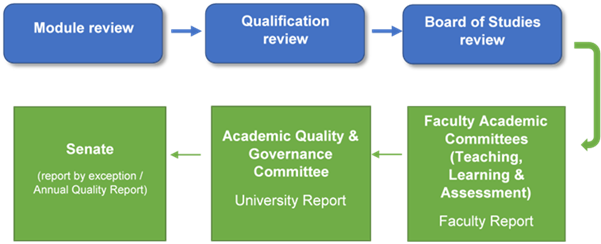
Quality and standards
You are here
- Home
- Teaching and research
- Quality and standards
- Annual Quality Monitoring and Enhancement
Annual Quality Monitoring and Enhancement
The Quality Monitoring and Enhancement (QME) process is one of the ways in which the OU regularly evaluates the quality and standards of its provision (also see Periodic Quality Reviews, Partnerships and Research sections).
QME at the OU supports the improvement of student outcomes and the student experience. The process achieves this through providing an annual opportunity to ‘step back’ and reflect/ holistically evaluate academic quality and standards. It provides a framework for annual evaluation, including a mechanism for escalation of issues through the OU’s governance structure.
Specifically, the aims of the QME process are:
- To evaluate sources of evidence (quantitative and qualitative) and decide where action is required to improve student outcomes and the student experience.
- Report by exception through faculty and institutional-level governance to bring to light issues requiring cross-faculty/ cross-institution attention, and so the OU can ascertain whether external requirements on academic quality/ standards are being met.
- Drive quality enhancement across the institution through sharing good practice between subject areas.
- Meet our external quality assurance requirements as a provider in all four nations.

A major development in the QME process has been the introduction of an Action Planner App (initially for module QME in 2024-25). Colleagues can use the Action Planner App to review their key module metrics, and record actions, good practice and narrative. The Action Planner App will make it much easier to thematically analyse good practice across the University, with the intention over time to build up a record of evidence of impact on student outcomes. This record can be used both to support the identification of evidence-based actions to address particular challenges, as well as to respond to external reviews such as the Quality Assurance Agency’s (QAA) Quality Enhancement Review and the Teaching Excellence Framework (TEF).
Another recent development has been the introduction of Board of Studies and faculty-level risk and success flags to QME. The risk flags help to focus action where it is most needed. Success flags help to identify good practice for sharing with colleagues, supported by evidence that the practice is linked to successful student outcomes.